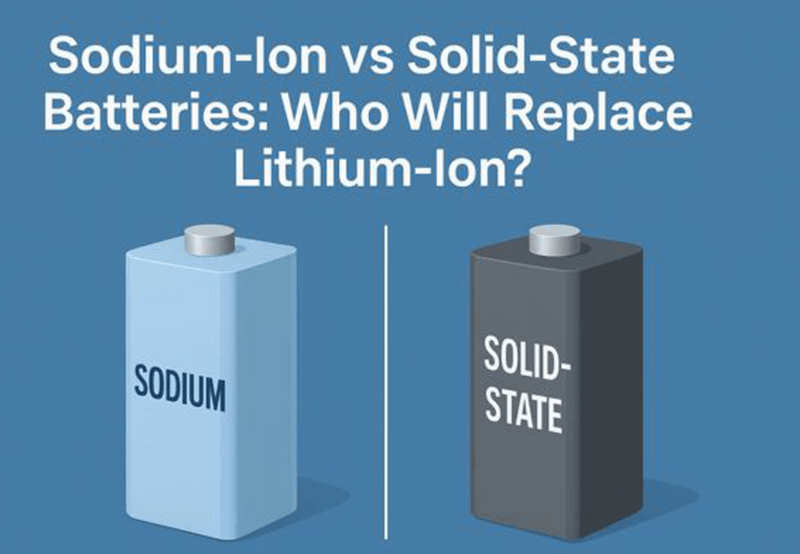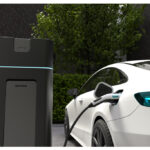Solid-State vs Sodium-Ion Batteries: The Future After Lithium-Ion?
Lithium-ion batteries have supported smartphones and laptops, electric vehicles, and energy storage systems worldwide for more than thirty years. However, as demand rises, the costs increase and the environmental implications of using lithium-ion batteries become a concern, there is a growing demand to find alternative battery sources. Solid-state batteries and sodium-ion batteries have become two major contenders. Will they be tomorrow’s energy storage? Let’s explore the technologies, compare them, and understand the advantages of solid state batteries and the advantages of sodium-ion battery systems.

What Is a Solid State Battery?
A solid-state battery is a type of battery that uses solid electrolytes instead of the liquid or gel-like electrolytes found in traditional lithium-ion batteries. So, when people ask, “what is a solid state battery?”—the answer lies in its name: solid. This shift in electrolyte type fundamentally changes how the battery works, potentially solving many issues inherent in current battery technologies.
Traditional lithium-ion batteries have safety risks due to the flammable nature of their liquid electrolytes. Solid-state batteries eliminate that flammability and open the door for the use of high-energy materials like lithium metal for the anode, which can significantly increase energy density.
Advantages of Solid State Batteries
The advantages of solid state batteries are driving massive investments and research across the globe. Here’s what makes them a game-changer:
1. Increased Energy Density: Solid-state batteries have the capacity to hold more energy in the same space than lithium-ion batteries. This would result in smartphones lasting longer or EVs with twice the range.
2. Enhanced Safety: Since they employ non-flammable solid electrolytes, solid-state batteries are much less likely to overheat and explode, a very dangerous problem with existing lithium-ion technology.
3. Faster Charging: Solid-state batteries may charge more quickly than their lithium-ion equivalent because they are more thermally stable and conductive.
4. Longer Lifespan: Solid-state batteries should have longer lifespans with more charge cycles, minimizing the necessity for repeated replacement—good for your bottom line and the environment.
5. More Compact Designs: There are fewer safety issues and greater energy density, enabling the manufacturers to design thinner, lighter-weight devices.
Sodium-Ion Battery: A Rising Star
While solid-state technology is promising, sodium-ion batteries are rapidly gaining attention as one of the most viable alternatives to lithium-ion batteries. These batteries work on a similar principle as lithium-ion ones but replace lithium with sodium—an element that is more abundant and affordable.
Why Sodium?
- Availability: Sodium is the sixth most abundant element on Earth
- Cost: Significantly cheaper to source and process than lithium.
- Environmental Impact: Extraction of sodium has a smaller environmental footprint compared to lithium mining.
Advantages of Sodium Ion Battery
Why is the sodium-ion battery such a promising alternative? Let’s find out the advantages of sodium-ion battery technology:
1. Low Cost: Sodium is usually rich and consequently a less expensive alternative, especially in big energy storage applications.
2. Temperature Tolerance: The cold weather makes sodium-ion batteries more efficient in contrast to lithium-ion making them applicable in diverse climates.
3. Eco-Friendliness: The extraction of sodium has lower environmental cost and the minerals used are not toxic and they are easier to recycle.
4. Safer Chemistry: Similarly to solid-state batteries, sodium-ion cells will prove to be more stable and resistant to thermal runaway.
5. Ideal for Grid Storage: Sodium-ion batteries are an ideal choice to store renewable energy and stabilize grids, given that sodium-ion batteries have low cost and cycle life.
Solid-State vs Sodium-Ion: Which One Is Better?
Solid-State batteries possess a greater energy density than lithium-ion batteries and are regarded as incredibly safe owing to the lack of flammability. Nevertheless, they are costly at present, are still in development and are difficult to scale. They will RTM longer cycle life and a possible increase in charging speed. Compared to lithium ion battery, the energy density of Sodium-Ion Batteries is weaker and has been regarded as safe, but not to the same extent as solid-state battery. A major advantage is that they are cheaper since the quantities of materials required to construct them is highly available. They are as well low in the level of scaling and entering into the commercial world. They have a similar or superior cycle life to that of a lithium-ion battery, and similar charging speeds.
Market Outlook: Who’s Investing in the Future?
The world’s biggest companies and research institutions are heavily investing in both technologies:
For Solid-State:
- Toyota plans to roll out EVs with solid-state batteries as early as 2027.
- QuantumScape, backed by Volkswagen, is developing scalable solid-state solutions for EVs.
- Samsung and LG Chem are also racing to build viable prototypes.
For Sodium-Ion:
- CATL, the world’s largest EV battery maker, has already launched its first-generation sodium-ion batteries.
- Faradion (UK-based) is building sodium-ion cells for stationary and transport applications.
- Natron Energy is deploying sodium-ion batteries for data centers and power grids.
Challenges Ahead
Solid-State:
- Manufacturing Complexity: Producing solid-state batteries at scale remains difficult and costly.
- Material Limitations: Finding the ideal solid electrolyte with high conductivity and stability is still an ongoing challenge.
Sodium-Ion:
- Energy Density: Sodium-ion batteries have lower energy density than lithium or solid-state batteries, limiting their use in high-performance applications like long-range EVs.
- Weight: Sodium is heavier than lithium, which can be a disadvantage in portable electronics or lightweight vehicles.
The Road Ahead: Complement, Not Replace?
The future may not be a winner-takes-all scenario. Instead of replacing lithium-ion batteries entirely, both solid-state and sodium-ion technologies could serve different needs:
- Solid-state batteries may dominate high-performance applications such as premium electric vehicles, aerospace, and advanced electronics.
- Sodium-ion batteries could become the go-to for low-cost, scalable energy storage like solar farms, backup grids, and budget-friendly EVs.
As we move toward a cleaner and more electrified future, diversifying battery technology is not just smart—it’s essential.
Conclusion
With global energy demands surging and sustainability taking center stage, the time has come to explore alternatives to lithium ion batteries. Solid-state batteries promise high performance, safety, and compact design, while sodium-ion batteries offer cost-effective, eco-friendly scalability.Whether you’re curious about “what is a solid state battery,” exploring the advantages of solid state batteries, or comparing them to the sodium ion battery revolution and the advantages of sodium ion battery, one thing is clear: the future is electric, and it’s more diverse than ever.As research continues and technologies mature, we may soon live in a world powered by a combination of lithium-ion, solid-state, and sodium-ion batteries—all working together to keep our lives moving, charged, and sustainable.
Frequently Asked Questions (FAQs)
A solid-state battery uses a solid electrolyte instead of the liquid or gel electrolytes found in traditional lithium-ion batteries. This design improves safety, energy density, and battery lifespan.
The key advantages of solid state batteries include higher energy density, faster charging, improved safety due to non-flammable electrolytes, and longer lifespan compared to lithium-ion batteries.
Yes, several alternatives to lithium-ion batteries are being developed, including solid-state batteries, sodium-ion batteries, and other chemistries like zinc-air, lithium-sulfur, and flow batteries.
A sodium ion battery is a type of rechargeable battery that uses sodium ions as charge carriers instead of lithium-ions. It’s considered a cost-effective and more environmentally friendly alternative to lithium-based batteries.
Advantages of sodium ion battery systems include lower cost, wider availability of raw materials, better performance in cold temperatures, and safer, more eco-friendly chemistry.











